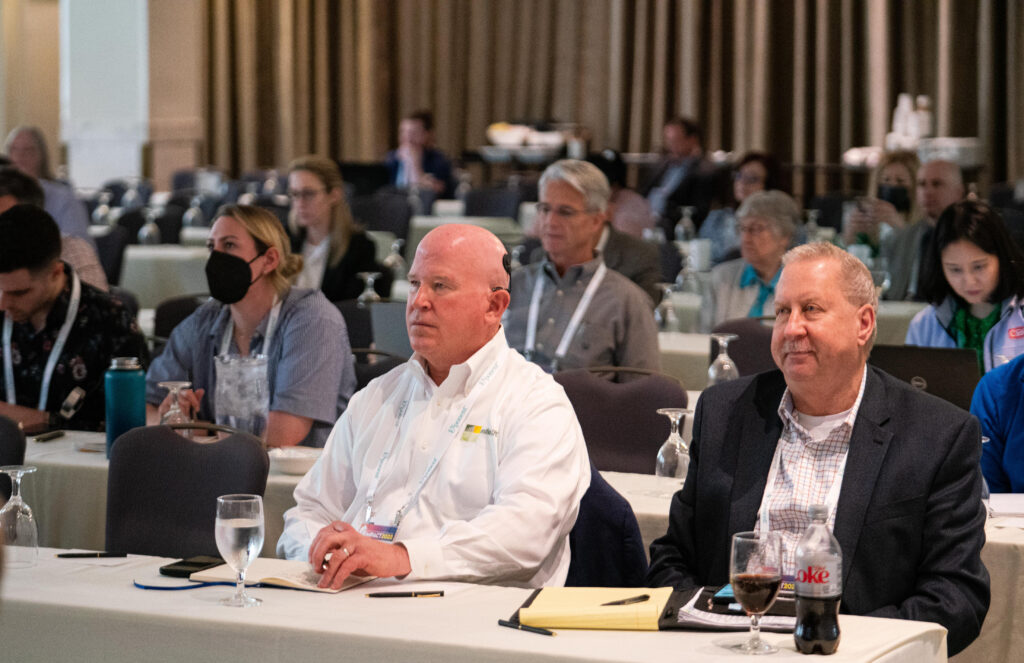Written on: September 1, 2022 by Nicholas Georges
The COVID-19 pandemic presented a number of new challenges for all of us. For many, one of the minor challenges was working from home for the first time. While I know several of you reading this article enjoyed participating in Teams or Zoom calls in your pajamas, interfacing with each other separated by glowing screens changed the way we communicate and collaborate.
At one point or another, we all experienced the panic and frustration of needing to reboot a computer before an important meeting, and you couldn’t make it 30 minutes without hearing a dog bark in the background or reminding someone they were on mute. After troubleshooting these “technical difficulties,” virtual meetings became almost too straightforward and tailored to check boxes on a “to-do” list. We lost the “hallway conversations” that happen organically in the office, as well as the ability to attend in-person events where we can talk about a wide range of issues without having a set an agenda and a “hard stop.”

For the most part, legislative and regulatory activity in the U.S. didn’t stop just because we were working from home. The first public hearing I virtually participated in was for a rulemaking conducted by the Hawaii Dept. of Health, and while I’m still bitter about participating in that rulemaking from my couch rather than on a tropical island in the Pacific, government officials and staff adjusted just as Industry did and it now seems that we’re busier than ever with new and changing laws and regulations. With all of this activity, it’s essential that industry continue to communicate and collaborate—and this isn’t the case for just the U.S.
While global supply chains have received a lot of attention, there have been increasing government requirements and demands around the world, and what happens in one country or region can directly impact the rest of the world. Take the European Union (EU), for example. As part of its Green Deal, Europe is progressing with its Chemicals Strategy for Sustainability (CSS), which aims to transform Europe’s economy into the first climate neutral continent by 2050. As part of the CSS, the EU is looking to overhaul its current chemicals legislation and phase out chemicals based on hazard. Even if you don’t do business in Europe, it is important to be aware of this activity because what is happening there will eventually come to other parts of the world in some shape or manner. For the U.S., it likely means future State activity that will try to copy elements of what the EU aims to complete, as we’ve already seen with chemical restrictions and increased labeling requirements.
At the end of June, Steve Caldeira, HCPA President & CEO, and I spent a couple of weeks in Europe meeting with a number of allied trade associations. These meetings aimed to foster and sustain relationships, build upon common and emerging policy issues and collaborate in an increasingly intertwined global economy. We also had the opportunity to meet with officials from the European Commission and share a U.S. perspective to help inform their ongoing work.
This was HCPA’s first international travel since the start of the pandemic and it was important to not only meet with the European Aerosol Federation (FEA) and the International Association for Soaps, Detergents & Maintenance Products (AISE), but other trade associations as well, such as the British Aerosol Manufacturers’ Association (BAMA), the French Aerosols Committee (Comité Français des Aérosols or CFA) and the International Fragrance Association (IFRA). While we met with most of these organizations virtually over the past two years, having these conversations in-person helped us engage in more productive dialogue and address a wider range of issues.
If you have the opportunity, I highly recommend attending FEA’s upcoming Global Aerosol Event: FEAerosol 2022 in Lisbon, Portugal (Sept. 21–22). This will also be the location for the next International Liaison Committee (ILC) meeting. The ILC is a network of global aerosol trade associations, and this year’s program will address topics such as recycling, extended producer responsibility (EPR) and post-consumer recycled content. Having this meeting in-person—for the first time since 2019—inevitably means that conversations in meetings, in hallways or at networking events could go in far more directions. However, even if you don’t have the ability to travel to Portugal for an aerosol conference, there will be many other meetings in the U.S. and globally to attend and meet face-to-face with industry representatives. You’ll just have to dig your business clothes out of the closet, however, because pajamas aren’t part of the dress code.
If you would like more information about this year’s ILC meeting or other opportunities for global aerosol collaboration, please contact me at ngeorges@thehcpa.org. SPRAY